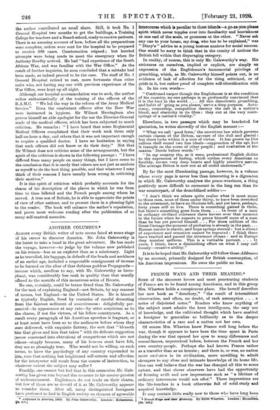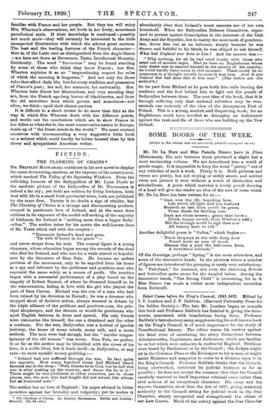FRENCH WAYS AND THEIR MEANING.* SOME of the sincerest lovers
and most penetrating students of France are to be found among Americans, and in this group Mrs. Wharton holds a conspicuous place. She herself describes her new book as " desultory," " the result of intermittent observation, and often, no doubt, of rash assumption . . . a series of disjointed notes." Readers who know anything of the subject must admire the keen intelligence, the easy use of knowledge, and the cultivated thought which have enabled a foreigner to generalize so brilliantly as to the deeper characteristics of a race and a nation not her own.
Of course Mrs. Wharton knew France well long before the war, though it appears to have been the time spent in Paris during the war that opened her eyes to many differences and resemblances, unperceived before, between the French and her own country-people. Perhaps she had known France rather as a traveller than as an inmate ; and there is, or was, no nation more exclusive in its civilization, more unwilling to admit strangers to any close and intimate knowledge of its home life. One can well believe that the war has changed all this to some extent, and that clever observers have bad the opportunity of forming swift and new impressions such as " a lifetime of ordinary intercourse would not off ei." These impressions are the life-touches in a book otherwise full of solid study and acquired knowledge.
It may contain little really new to those who have long been
• Breech-Wow end &heir Meaning. By-Edith Wharton. Landon: Macmillan. LG. net.] familiar with France and her people. But they too will enjoy Mrs. Wharton's observations, set forth in her lively, sometimes paradoxical style. If their knowledge is confirmed—possibly not much more—they will certainly be interested in the little unexpected illustrations with which she adorns great matters. The beet and the leading features of the French character— that is, of the Latin race as distinguished from the Anglo-Saxon —are here set down as Reverence, Taste, Intellectual Honesty, Continuity. The word " Reverence " may be found startling by some of those who think they know France ; but Mrs. Wharton explains it as an " unquestioning respect for rules of which the meaning is forgotten." And not only for those rules that affect daily life, but for every tradition and possession of France's past ; her soil, her manners, her nationality. Mrs. Wharton here draws her illustrations, and very amusing they are, from the French age-long horror of blackberries, and from the old unwritten laws which govern and sometimes—not often, we think—spoil their dinner-parties.
It is difficult in a short review to do more than hint at the way in which Mrs. Wharton deals with her different points, and works out the conclusions which are to show France to her Allies as what she is, the most conservative nation in Europe, made up of " the freest minds in the world." We must content ourselves with recommending a very suggestive little book on a subject which could hardly be better treated than by this clever and sympathetic American writer.



































 Previous page
Previous page